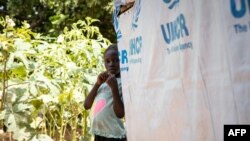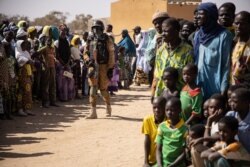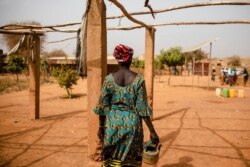In the West African country of Burkina Faso, a de facto ban is preventing journalists from visiting sites for internally displaced people.
For at least a year, the Ministry of Women, National Solidarity, Family and Humanitarian Action has been turning down official requests to visit camps, local journalists say.
A Burkina Faso government spokesperson has cited two reasons for visits being denied: the protection of the "dignity" of those in the camps and the safety of journalists.
While armed groups are a threat in some parts of the country, many of the camps for internally displaced people (IDPs) are in safer regions and have not been the target of attacks. Many are accessible to media with little risk, journalists say.
Humanitarians and journalists believe the ban is linked to a report published by the nongovernmental organization Oxfam in May 2020. The report focused on the experiences of female IDPs, who it said are at risk of sexual abuse.
Analysts and those who cover the camps say the ban comes amid a more restrictive environment for reporting in Burkina Faso, including a 2019 law that carries a 10-year sentence for reporting that "demoralizes" the military.
"This new policy follows the worsening censorship trend in Burkina Faso," said Alexandra Lamarche, a senior advocate for West Africa at the Washington-based advocacy group Refugees International. "While the government may claim to be preserving the dignity of its displaced citizens, this is yet another effort to deny and hide the true magnitude of the crisis."
More than 1.2 million people have been displaced by Burkina Faso's war with rebel groups in the north and east of the country, which started in 2015, according to United Nations estimates. Many of the armed groups are linked to the Islamic State group and al-Qaida.
"At present, 78% of these displaced people live in displacement sites," Lamarche said.
Unlike refugees, IDPs seek safety within their own country.
Burkina Faso Minister of Communications Ousseni Tamboura, who earlier cited media safety concerns for the ban, defended the country's relationship with journalists, telling VOA, "Freedom of the press is doing very well."
The Ministry of Women, National Solidarity, Family and Humanitarian Action did not respond to VOA's request for an interview.
Media access
An international journalist described the lack of access to the camps as "unfortunate."
"The people I've spoken to say they want their voices heard so people will know what they're going through," said the journalist, who is based in the region and asked to remain anonymous. "It's the best way for people to understand their situation."
The government's argument that the ban is designed to protect the safety of journalists doesn't hold water either, the journalist said. There are sites where neither IDPs nor journalists are in danger.
"If the government wants to protect their dignity, it shouldn't silence them," the journalist told VOA, adding that "it's part of a larger picture of a shrinking media freedom space."
Some members of the media say they have found other ways to report on the camps, such as visiting IDPs in unofficial host communities or walking in without permission when sites are unattended. Others say they ask residents to come out to be interviewed.
Without access, journalists cannot verify reports of water shortages and other issues that the camp residents say they face.
Press freedom record
Media watchdog Reporters Without Borders (RSF) has said that Burkina Faso is "one of Africa's success stories" and cited its "dynamic, professional and diverse media."
In RSF's 2021 World Press Freedom Index, where 1 is the freest, the country ranks 37th out of 180 countries, the fifth best in Africa.
In the country, however, reports deemed to have "demoralized" the military carry a 10-year prison sentence and large fines. To date, no journalist or outlet has been prosecuted under the 2019 law, but its vague wording has raised concerns.
A 2020 report in the Columbia Journalism Review found that local journalists, when reporting on the ongoing conflict, have "complained of a culture of intimidation in which informants are afraid to speak."
Two news outlets were reprimanded over their coverage of a raid on the village of Solhan, the biggest attack the country has seen since its conflict began.
A local radio station, Omega, was suspended for five days after it reported apparently false claims of further attacks in the vicinity one day after the initial assault. And the French radio station RFI was reprimanded for reporting that the deputy mayor of Solhan had said there was a second attack one day later, which the military denied.
In response to the RFI case, government minister Tamboura said the deputy mayor had not been at the location and therefore could not "guarantee the truth of the facts."
Tamboura also referred VOA to Burkina Faso's high ranking on the RSF index, saying, "The professional media associations and the ministry are in a regular working relationship on many matters of concern, and I have not yet heard or received any letters relating to these complaints."
French Burkinabe journalist Fanny Noaro-Kabré said recent events "show things are getting tougher, [but] I find it easy to be a journalist here."
"No threats, no intimidation. Accreditation can be obtained, for the moment, easily,” said Noaro-Kabré, who has been based in the country for six years. "Compared to other countries on the continent, we don't have to hide."
Vital role
Investigative reporting and coverage of human rights is important, said Jessica Ní Mhainín, a policy research and advocacy officer at the freedom of expression organization Index on Censorship.
"Journalists fulfill a crucial public service by holding power to account, but the authorities must provide them with an enabling environment in order for them to do so," Ní Mhainín added.
Lamarche said her organization had seen similar policies enforced in other countries with humanitarian crises, adding, "Very limited good comes of such efforts."
In northeast Nigeria, where Boko Haram is active, security forces control the movement of people in and out of camps and have used this authority to prevent reporters from reporting on the crisis, she said.
IDP sites in Burkina Faso fall under the jurisdiction of the government, not humanitarian groups.
When asked if they had seen a dearth of local reporting on IDPs since the ban was implemented, a local journalist replied, "Of course."
The journalist, who asked not to be named for fear of reprisals, added, "Now, we can't be expected to gather information on all sorts of subjects that need to be reported: the rapes and sexual abuse committed at the [IDP] sites, sometimes the lack of food, water and housing."







